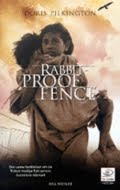by Doris Pilkington
 I saw the film based on this book a few years ago, and it moved me so much I wanted to read the original story. Rabbit-Proof Fence is about three aboriginal girls in 1930\’s Australia who were taken from their mother and put in a camp where they were forced to learn English customs, beaten for speaking their own language, and taught to work as domestic servants. This was enforced by the government at the time because the children were of mixed race; their father was white. The girls, two sisters and a cousin, eventually escaped the misery of the camp and followed the rabbit-proof fence across the Australian outback to find their way home. Their journey was arduous and long. They walked most of the way, through desert conditions. They had to face heat, thirst, hunger and fatigue, and avoid professional trackers who were sent after them. They had no supplies or provisions, but survived on their own foraging skills and handouts from sympathetic people (both white and native) encountered on their journey. They traveled in total over 1,000 miles and sadly, even after reaching their home in Jigalong, were not safe from the government\’s attention.
I saw the film based on this book a few years ago, and it moved me so much I wanted to read the original story. Rabbit-Proof Fence is about three aboriginal girls in 1930\’s Australia who were taken from their mother and put in a camp where they were forced to learn English customs, beaten for speaking their own language, and taught to work as domestic servants. This was enforced by the government at the time because the children were of mixed race; their father was white. The girls, two sisters and a cousin, eventually escaped the misery of the camp and followed the rabbit-proof fence across the Australian outback to find their way home. Their journey was arduous and long. They walked most of the way, through desert conditions. They had to face heat, thirst, hunger and fatigue, and avoid professional trackers who were sent after them. They had no supplies or provisions, but survived on their own foraging skills and handouts from sympathetic people (both white and native) encountered on their journey. They traveled in total over 1,000 miles and sadly, even after reaching their home in Jigalong, were not safe from the government\’s attention.
While I find this story amazing, and my heart ached for the girls, for once the movie outshines the book. Even though the film was overly dramatic and a few aspects of the story were altered, it was far more engaging and moving than the book. The book was written by the daughter of one of the girls who made the trek, and she first heard about the incident through oral storytellers. She gathered information and documents verifying the story from a few other sources, and wrote it down as she would have told it to another person, some sixty years after the events had taken place. The result is a rather dry, sometimes scattered account with frequent awkward passages and stiff syntax. It is just not very engaging to read. It still strikes me as an important book; I did not know about how aboriginal people were treated in Australia before I read it, but it can be hard to appreciate. I would recommend seeing the film first, and then reading the book after if you want the more factual account.
Rating: 2/5 …….. 160 pages, 1996
More opinions:
World Lit
Eric\’s IAH Blog


8 Responses
Wow! It's not often that the movie is better than the book. This sounds like an amazing story. The movie Australia kind of brushed on this issue a little bit.
My daughter and I were just talking about the movie last night! We borrowed it from the library a couple years ago after catching a preview — definitely one of the better movies we've watched together. Sorry to hear that the book wasn't as good but I'm glad it inspired someone enough to see it brought to the big screen.
Well, that is a kicker! It IS a fabulous movie though, but you rarely see the movie outshine the book. I guess that is a tribute to the screenwriter and/or the director!
I have not seen the movie or read the book. I have grown up hearing enough stories about this time I font want to hear more.Sadly a lot of Australians do not know about this period either. This group of people are called \”The Stolen Generation\”. I worked with a lady whose mother was one of these people and who knew the author. There are other books on the topic if you are interested it really is shocking. White Australia thought they were \”helping\” the children were taken given new names, refused contact with their families, and that was just for starters. This went on right up to about the 70's I believe.
Drat. I read about this film, and thought it sounded way more upsetting than I can handle on film, so I was planning to read the book instead. I'd love to read something about this period in Australian history – I hardly know anything about Australia.
Aren't I supposed to be reading your blog to find out about books? Now I'm going to have to look into a movie. That seems so wrong somehow. Sounds like I might need to pick up a big pack of kleenex with the movie though. It must have been hell for them. I have heard of the stolen generation before, but I can't for the life of me remember what book or film it was. I just know it was dramatic and sad and still continues to be.
The film made me cry. Not many movies do that.
I will have to check out the movie. What a bummer that the book wasn't better.